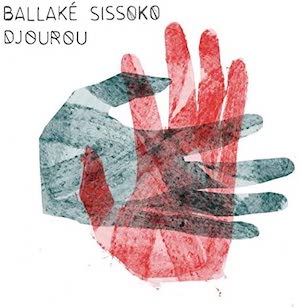
Ballaké Sissoko – Djourou
Nø Førmat – 9 April 2021
There is something crisp, clean and very very pleasing about the sound of the kora. It makes me want to throw open the windows and feel the crispness, succumb to the light and share the joy and the pathos of the tunes – even if it is a grey, damp early spring morning in Northamptonshire. I first became aware of Ballaké Sissoko a decade or so ago when I caught a Lá Blogotheque video of Ballaké with cellist Vincent Segal in a small Parisian cafe and was immediately captured by the contrast and the synergy of the two musicians and their instruments. Later I considered that actually, it was not that the apparent difference between the instruments themselves that was interesting, but what they suggested about the music that they played, about their cultural representation, and the questions this raised about the validity of musical and geographical boundaries.
Come forward a decade and Ballaké has a new album, Djourou, that explores a number of connections, with singers, with instrumentalists and across a wide range of musical styles.
The opening resonance of a strummed kora string announces the start, the first track, Demba KundaI. The sound from the string drifts away, a second strum and then a gentle flurry of intricate notes that lead subtly into a pulse that pops up every now and then to remind, or rather check that you are keeping the correct time. Such solo pieces are wonderful to hear, the instrument covering a wide range and with the two hands working together sounds can be built upon sounds. Mande Tabolo, another solo piece, has one of those introductions that I just love about Malian music. These intros build and build, making you wonder where they are going, and then there it is again, that pulse, that beat, that reason why you are unaware of its arrival until you realise you have been moving with it, finger, foot or body.
However, this album is not just about Ballaké. Djourou is a Bambara word meaning string, a thread that weaves its way through the album. That thread is partly Ballaké himself, the maker of connections, but it is also about connections made by the threads of the music, how they can, and have, become attached musically – and geographically – near and far. In the title track Djourou this connection is with the Gambian griot and kora player Sonah Jobarteh. They play together in harmony and to this listener, with an ease that surrounds them and me. Watch the video to see how much they gel, despite Sonah being concerned about coming together with her strict, meticulous practice and Ballaké’s looser attitude and approach. Consider that, and watch at their faces as they play together.
These threads sometimes are even nearer to Mali. In Guelen he teams up with one of the greatest African singers, the “Golden Voice of Africa” Salif Keita. Salif was one of the first African artists I came across when I started getting into music from there, many, many decades ago. He is still at the top of his game and the power and warmth of his voice is so evident here.
Jeu Sur La Symphonie Fantastique brings me back to where I first came across Ballaké. As well as Vincent Segal though, he is joined here by Patrick Messina to revision Berlioz in a manner that does it great justice. I love the way that the slow cello and the fast kora add layers that create tension, made ever clearer by Patrick’s clarinet gently flitting over the rhythms.
The threads also embrace connections also made in France, with Camille singing Kora, Mali/French rap star Oxmo Puccino proving there are no boundaries when Ballaké is paying out the string in Frotter Les Mains, and by complete contrast, with English-born Piers Faccini on Kadidja. Three totally different artists and styles, but linked by the versatility of the kora and the experimentation of the player.
All this makes me wonder if Ballaké is setting out to prove that the kora, an instrument already familiar in the wider world, is truly a world instrument and can work with many styles. Perhaps it imposes an African air on a tune but then there is no problem with that; other instruments from other cultures have been subsumed into western music. Or is it an exploration of the possibility of sounds from various places coming together? After all, there is no question of the origin of the banjo, now a ready tool in contemporary folk, so why not others?
Whatever the reason, this album covers a lot of ground and makes some really exciting connections. I am also aware that it is one thing to enjoy the sound but very much another thing to appreciate the mastery of the technique, the free flow of sound whilst the fingers work delicately, quickly and with a soul of their own. Listen to Djourou as a work in its own right, and listen to this again as a starting point of paying out your own threads. Excellent.
